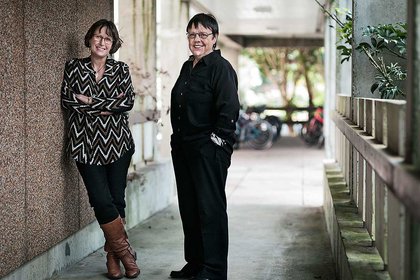
From left: Professor Jackie Sanders and Professor Robyn Munford, Massey University’s School of Social Work. Photo credit: Jane Ussher.
A new online tool for people working with vulnerable youth, based on research and expertise from Massey University’s School of Social Work, is being launched in Auckland this Friday.
The Massey University PARTH model is a set of practice orientations identified in the Youth Transitions project, carried out by Professor Robyn Munford and Professor Jackie Sanders.
The online module has been developed by Massey in partnership with Youthline. It is designed to guide interactions with young people on immediate issues, as well as their long-term goals. If successful, it is hoped the module will be rolled out nationwide, and potentially around the world.
Professor Sanders says it focuses on how practitioners work with young people. “It’s youth centered, meaning the young people are at the centre of decision making. The interventions build on the resources and capacities they bring to the support relationship. It helps workers put into practice the skills needed to listen and act in ways that meet a young person’s needs.”
The PARTH model focuses on five principles key to supporting youth:
P – Passion, Perseverance, Persistence, Perspective
A – Adaptability, Agility, Agency, Action-oriented
R – Relationships, Respect, Reciprocity, Relevant, Responsive
T – Time, Trust, Transparency, Thresholds, Transitions
H – Honesty, Humility, Hopeful-orientation
Professor Munford says practitioners using the model say they are able to make better decisions about how to support vulnerable youth with young people more likely to feel their support is relevant and meaningful. This leads to youth being more engaged in interventions and to better outcomes, she says.
“Leaving school, furthering your education, joining the workforce, establishing an independent base and making identity and lifestyle choices are all part of growing up, yet a significant proportion of young New Zealanders between the ages of 13 and 17 find they have insufficient support to help them to successfully make these changes,” Professor Munford says.
“Until now, there has been no clear evidence of how education, health, welfare, youth justice and community services can best support young people to move forward with their lives, or why they fall through the cracks at this critical stage. Our 10-year longitudinal study seeks to investigate the linkages and make major contributions to policy and practice,” she says.
Hearing youth and youth workers
Pivotal to the research are the voices of young people receiving care from multiple social services. A total of 593 young people have participated in three annual surveys, and detailed case studies on 107 of these youth are underway. Professor Sanders says these voices provide powerful testimony about keeping them engaged, even when the circumstances of their lives and their sometimes challenging behaviours make this difficult. This work led to the development of the PARTH model, now developed into a training tool for youth workers such as those at Youthline.
The research also builds on and significantly extends an international study led by Professor Michael Ungar of Dalhousie University in Canada. Professor Ungar says because the New Zealand team collected a huge amount of data, over multiple points of time with the same young people, there is now a two-country data set which we can use to understand children’s changing patterns of service use and resilience over time.
“This is extremely valuable, as this is the first study in the world like it. We are already in the process of developing new theories to explain resilience in ways never before discussed,” Professor Ungar says. “Even better, the New Zealand data captured a national sample of young people. That has meant that even on its own, it has provided valuable insights into how children in one country can follow very different pathways to resilience.”
The New Zealand research team also helped Professor Ungar develop several of the qualitative methodologies used in other studies around the world. “Their research group is among the best there is when working with vulnerable young people,” he says.
Partnering with Youthline
Youthline PARTH project lead Robyn Lentell says creating the module has been a very rewarding and creative journey. “In the beginning I read all of Professor Munford and Sanders’ journal publications and spent weeks analysing what content would be the most important to convey to youth workers and professionals working with young people. After a few edits and rewrites I brought Youthline’s youth workers on board. They were the ones who completely brought the content to life by providing practical examples of where they have used and applied the findings.”
Youthline chief executive Stephen Bell says, “Massey University is to be commended for having the foresight to form community partnerships in the development of the PARTH model. Youthline is proud to be a part of the solution. Good intentions alone are not good enough. This longitudinal research will equip those working with young people to effectively change lives.
“Engagement is the key to building an environment where young people reach their potential. A skilled workforce providing consistent and meaningful contact with young people can change their life trajectory with flow on benefits for their families and communities,” he says.
Click here to see the online module.
This research programme was funded by the Ministry of Business, Innovation and Employment. For more information on Professor Munford and Professor Sander’s work, click here.